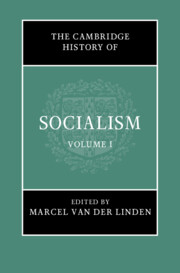Book contents
- The Cambridge History of Socialism
- The Cambridge History of Socialism
- The Cambridge History of Socialism
- Copyright page
- Contents
- Figures
- Maps
- Tables
- Contributors to Volume I
- Abbreviations
- Introduction to Volume I
- Part I Beginnings
- Egalitarianism
- Early Socialisms
- The Arrival of the Hostile Siblings: Marxism and Anarchism
- 10 The International Working Men’s Association (1864–1876/7)
- 11 Karl Marx, Friedrich Engels, and Early Workers’ Movements
- 12 Pierre-Joseph Proudhon’s Mutualist Social Science
- 13 Mikhail Bakunin and Social Anarchism
- 14 Peter Kropotkin and Communist Anarchism
- Part II Negating State Power
- Index
- References
14 - Peter Kropotkin and Communist Anarchism
from The Arrival of the Hostile Siblings: Marxism and Anarchism
Published online by Cambridge University Press: 03 November 2022
- The Cambridge History of Socialism
- The Cambridge History of Socialism
- The Cambridge History of Socialism
- Copyright page
- Contents
- Figures
- Maps
- Tables
- Contributors to Volume I
- Abbreviations
- Introduction to Volume I
- Part I Beginnings
- Egalitarianism
- Early Socialisms
- The Arrival of the Hostile Siblings: Marxism and Anarchism
- 10 The International Working Men’s Association (1864–1876/7)
- 11 Karl Marx, Friedrich Engels, and Early Workers’ Movements
- 12 Pierre-Joseph Proudhon’s Mutualist Social Science
- 13 Mikhail Bakunin and Social Anarchism
- 14 Peter Kropotkin and Communist Anarchism
- Part II Negating State Power
- Index
- References
Summary
Peter Kropotkin (1842–1921) is remembered as a theoretician of anarchism and one of the leading exponents of anarcho-communism, a doctrine he helped to elaborate with his comrades Carlo Cafiero and Elisée Reclus in the late 1870s. He grew up in what he described as Moscow’s Faubourg Saint-Germain, into considerable privilege, and attended the prestigious corps of pages, an elite military academy in St Petersburg, from 1857. In 1860 he edited his first revolutionary paper, then as a constitutionalist. Two years later, looking for more outlets for his rebellious instincts, Kropotkin passed up the opportunity of a glittering career at the imperial court and joined the Cossacks stationed in the far east of Russia.
- Type
- Chapter
- Information
- The Cambridge History of Socialism , pp. 331 - 354Publisher: Cambridge University PressPrint publication year: 2022

